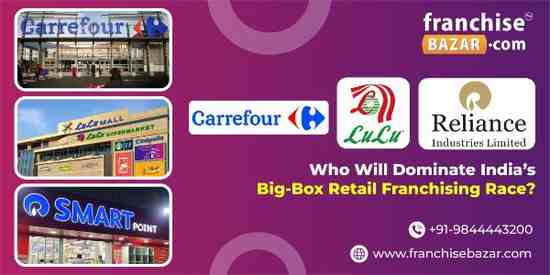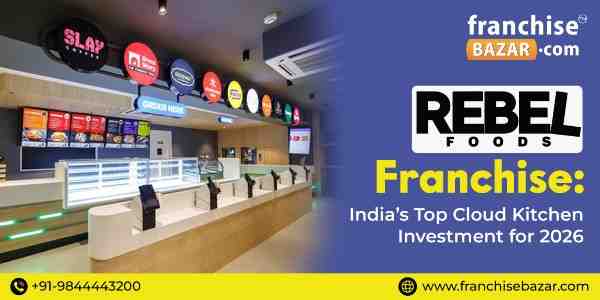Carrefour, Lulu, and Reliance: India’s Best Big-Box Retail Franchise

Written By: Resham Daswani
The retail sector in India is about to undergo some radical changes. Franchising big-box stores in India is ripe for explosion as consumer spending power increases outside of metros and into secondary and tertiary cities. Major companies, both domestic and international, are shifting their focus from company-owned formats to franchise-led expansion in order to efficiently scale and satisfy demand.
Three retail behemoths—Carrefour, Lulu Group, and Reliance Retail—are squaring off in this retail war. Each has its own unique business model, international history, and aggressive plans for India. However, the most important question is: Which company will lead organised big-box retail in India in the future?
Now we can understand the scenery.
Why Big-Box Retail Franchise Is Successful in India
Increasingly important in India is the big-box retail concept, which consists of large-size stores (usually more than 10,000 sq. ft.) selling food, gadgets, apparel, and household necessities because:
- Increasing spending by the middle class
- Rapid urbanisation in Tier 2 and Tier 3 cities
- Choosing a single vendor
- Merging digital and brick-and-mortar stores
- Local franchisees' enthusiasm for organised retail grows
Hypermarkets and big-box stores are appealing investment opportunities due to their scale, variety of SKUs, and logistical efficiencies, in contrast to boutique retail and speciality franchises.
Is Carrefour Re-entering the Market with a Focus on Franchises?
After failing to establish a foothold in the Indian market with its business-to-business cash-and-carry strategy, French giant Carrefour left the country in 2014. Carrefour, on the other hand, is allegedly planning to re-enter the market through franchise partnerships or master franchise alliances now that franchise markets have matured and infrastructure has improved.
Highlights of this big-box retail franchise brand include:
- Proven franchise model with a strong presence in Latin America, Asia, and the Middle East
- Reputation for private label products and knowledge of source chains
- Before expanding into new markets, make sure your selection and operations are localised.
Challenges Specific to India include:
- Recall of the brand decreases after leaving
- Will necessitate a reliable local affiliate, either through a joint venture or a master franchise.
- Struggling to compete with established domestic companies such as Reliance
Possible Market for Franchises in India:
- Perfect for those looking to invest in properties with room to spare (25,000 to 50,000 sq. ft.)
- Ideal for places with a large expat community and a diverse range of cuisines
- If re-entry is announced, they may provide exclusive regional franchise zones.
The Gulf Giant Lulu Group Is Increasing Its Bet on India
A company called Lulu Group, based in Abu Dhabi, runs some of the biggest hypermarkets in the Gulf. They have previously invested heavily in the retail infrastructure of several Indian cities, including Lucknow, Chennai, and Hyderabad.
Primary Actions:
- Lulu Mall, Kochi, the biggest mall in India, and a number of other Lulu Hypermarkets
- Delhi, Bengaluru, and Ahmedabad hypermarkets to be unveiled soon
- Emphasis on high-end, interactive shopping with food courts, movie theatres
Indicators for Franchising:
Lulu is reportedly considering a franchise-led strategy to expedite expansion in Northeast India and Tier 2/3 cities, even though the majority of their Indian locations remain company-operated. Regional franchise rights are likely to be offered, particularly in neglected areas.
Forecast for the Lulu Franchise Model:
- Costly initial investment (~₹10–₹30 crore per site).
- Easy access to a unified marketing, logistics, and procurement system
- Profitable private label and imported stock keeping units
Ideal for:: Real estate investors that have a firm grasp of the area, are willing to play the long game, and have access to property.
Reliance Retail: The Indian Retail Giant Embracing Omnichannel
The biggest retailer in India, Reliance Retail, is a byword for size and vertical integration. When it comes to food stores and value retailers, its names are all over the map: Reliance Fresh, Smart Bazaar, and Reliance Smart.
Significant Actions:
- Runs more than 18,000 outlets in several industries
- Purchased assets from Future Group in order to broaden our reach
- Debuts Smart Bazaar, Rival to D-Mart and Spencer's
Methodology for Franchising:
Franchisees are being approached by Reliance for:
- Affluent Market
- Fashion trends
- (Electronics) Reliance Digital
Pay special attention to Tier 2 and Tier 3 cities in India, where kirana owners and local entrepreneurs can open Reliance-branded stores in their current locations.
Key Points of the Reliance Franchise:
- Modest to low capital expenditure models (₹50 lakh - ₹2 crore)
- Provides options for models with a set margin or a revenue sharing
- Assistance with branding, training, point-of-sale technology, and inventory
The Benefits of Owning a Franchise:
- Renowned name
- An exceptional supply network
- Connecting JioMart and ONDC with advanced technology
Reasons Why Big-Box Franchising Is the Latest Investment Hotspot
By 2030, the organised retail sector in India is expected to reach $230 billion.
Industry estimates place the value of the Indian retail market at $2 trillion by 2032, with organised retail reaching over $230 billion by 2030 (FICCI, Technopak). As customers move away from unorganised kirana shops and towards modern retail, large-format stores and franchised hypermarkets will account for a significant portion of this expansion.
Rather than starting from square one, investors in big-box retail franchises in India may ride the growing wave with the support of popular brands, national logistics, and the confidence of consumers.
The Boom in Tier 2/3 Consumption: An Underserved Market Prepared for Growth
Despite the saturation of India's metros, Tier 2 and 3 cities are projected to account for more than 55% of the country's consumption growth by 2026. Currently, these markets are going through
- Greater discretionary spending
- Changes in Lifestyles Driven by Urbanisation
- The need for well-organised grocery and necessities is on the rise.
- The opening of more shopping centres
Such areas are being targeted by big-box retail franchise brands such as Reliance Smart Bazaar and the soon-to-be-expanded Lulu. Franchising provides an early mover advantage to investors in or familiar with these locations due to the large potential customer base, low levels of branded competition, and great catchment potential.
A Lower CapEx Than the Development of a Private Brand
Many franchise-ready models, such as Reliance or Spencer's, can be started in the ₹50 lakh - ₹2 crore range, based on location and format, but starting an independent big-box retail operation from scratch may take ₹10-₹30 crore.
Integrating Digitally and Offering Omnichannel Access
Big-box franchising is becoming more tech-driven and digitally linked; it's not just about brick-and-mortar anymore. In today's market, franchisees enjoy:
- Connecting online and physical sales channels (for instance, when clients place an order on JioMart and then pick it up at a franchise store)
- engagement with the ONDC (improving local discoverability)
- Insights at the SKU level, regional consumption patterns, and data-driven decision-making
- Systems for immediate feedback, digital wallets, and customer loyalty platforms
If you want to be competitive with e-commerce and informal retail, you need to boost sales, operational efficiency, and client retention.
Investors, take note: big-box franchising is now all about real estate, technology, and fast-moving consumer goods (FMCG), not just retail. Franchising big-box retail stores in India in 2025 provides the ideal meeting point of:
- Growing interest from buyers
- Foundational systems for franchisee support
- Laws and technological facilitators
- Adaptable financial strategies
From 50 lakh mini-formats to 30 crore premium hypermarkets, the sector offers entry opportunities at various scales, regardless of whether you are a first-time entrepreneur, retail veteran, real estate owner, or NRI.
CTA
Is a Big-Box Franchise Something You're Considering? Count on FranchiseBazar to Help You
Collaborate with us if you're interested in big-box retail franchising in India. For a successful franchise venture, FranchiseBazar is your one-stop shop for evaluating small and big retail franchise brands.
Disclaimer: The brands mentioned in this blog are the recommendations provided by the author. FranchiseBAZAR does not claim to work with these brands / represent them / or are associated with them in any manner. Investors and prospective franchisees are to do their own due diligence before investing in any franchise business at their own risk and discretion. FranchiseBAZAR or its Directors disclaim any liability or risks arising out of any transactions that may take place due to the information provided in this blog.
Recent Blogs

Written By: Harsh Vardhan Singh
Cloud kitchens...

Written By: Bandana Gupta
The luxury salon market...

Written By: Gouri Ghosh
BBLUNT is a powerful...

Written By: Khushboo Verma
India's menswear...
Why Should I Register?
You are seeking to access information which is provided only to registered members. It takes less than a minute to register and access information on FRANCHISEBAZAR.